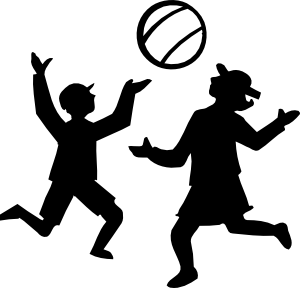
Definition of Play
"Play involves a free choice activity that is non-literal, self-motivated, enjoyable and process oriented. Critical to this definition is the non-literal, non-realistic aspect. This means external aspects of time, use of materials, the environment, rules of the play activity, and roles of the participants are all made up by the children playing. They are based on the child's sense of reality" (Wardle, 1987, p. 27).
"Children do not play for a reward-praise, money, or food. They play because they like it."(p. 28).
Children who compete to make the best wooden ship are not playing. Children who are told they must use the block with an "A" on it to create a word are not playing, and children who are asked to label the colors of their paints, instead of using them to create a picture, are not playing.
Types of Play
Motor/Physical Play
Motor play provides critical opportunities for children to develop both individual gross and fine muscle strength and an overall integration of muscles, nerves, and brain functions. Recent research has confirmed the critical link between stimulating activity and brain development (Shore, 1997). Young children must have ample opportunities to develop physically, and motor play instills this disposition toward physical activity. With so many American adults experiencing health problems from being overweight, we have a responsibility to encourage physical activity in young children.
Social Play
A variety of opportunities for children to engage in social play are the best mechanisms for progressing through the different social stages. By interacting with others in play settings, children learn social rules such as, give and take, reciprocity, cooperation, and sharing. Through a range of interactions with children at different social stages, children also learn to use moral reasoning to develop a mature sense of values. To be prepared to function effectively in the adult world, children need to participate in lots of social play.
Constructive Play
Constructive play is when children manipulate their environment to create things. This type of play occurs when children build towers and cities with blocks, play in the sand, construct contraptions on the woodworking bench, and draw murals with chalk on the sidewalk. Constructive play allows children to experiment with objects; find out combinations that work and don't work; and learn basic knowledge about stacking, building, drawing, damming, and constructing. It also gives children a sense of accomplishment and empowers them with control of their environment. Children who are comfortable manipulating objects and materials also become good at manipulating words, ideas, and concepts.
Fantasy Play
Children learn to abstract, to try out new roles and possible situations, and to experiment with language and emotions with fantasy play. In addition, children develop flexible thinking; learn to create beyond the here and now; stretch their imaginations; use new words and word combinations in a risk-free environment; and use numbers and words to express ideas, concepts, dreams, and histories. In an ever-more technological society, lots of practice with all forms of abstraction-time, place, amount, symbols, words, and ideas-is essential.
Games With Rules
Developmentally, most children progress from an egocentric view of the world to an understanding of the importance of social contracts and rules. Part of this development occurs as they learn that games like Follow the Leader, Red Rover, Simon Says, baseball, and soccer cannot function without everyone adhering to the same set of rules. This "games with rules" concept teaches children a critically important concept-the game of life has rules (laws) that we all must follow to function productively (Wardle, 1987).
from: http://www.earlychildhoodnews.com/ earlychildhood/article_view.aspx?ArticleID=127
Humorous Video
Kids Advocating For Kids - MORE RECESS!
Want to find out more? Here are more resources!
A new study compiled by Julia Hawes of MEDILL found unstructured time on the swings and jungle gym may benefit children's physical, social and behavioral development during more structured class time. The new study shows nearly a 10 percent increase improvement in classroom behavior between students who get little to no recess and those who receive more than 30 minutes of free time each day.

"Play is an excellent example of the ways in which biology and culture influence each other, especially during childhood. Specifically, the innovative possibilities associated with different forms of play behavior during the juvenile period can influence individuals' skill acquisition, and possibly influence the development of the species. In order to understand play in this broad sense, it is necessary to understand its phylogenetic development (across monkeys, great apes, and humans), its place within human development, and its function(s) and atecedents. Such an understanding of the role of play in childhood has implications for a deeper understanding of the role of development in the human experience."
from the book The Role of Play in Human Development by Anthony Pelligrini